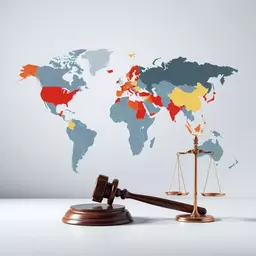Responding to an Interpol Red Notice

Did you know that an Interpol Red Notice is not an arrest warrant, but rather a request for cooperation among law enforcement agencies? You can find more details about Red Notices on the Interpol website. Understanding the nuances of such notices is crucial for anyone facing potential legal issues across borders. This article details the essential steps to take when confronted with a Red Notice, ensuring you can navigate the complexities of international law with confidence.
What You Will Learn
- An Interpol Red Notice is a request for provisional arrest pending extradition, not a formal arrest warrant.
- Ignoring a Red Notice can lead to serious legal complications, including arrests at borders and increased scrutiny.
- Understanding international law and treaties concerning extradition can significantly influence how a Red Notice is handled.
- Consulting specialized legal counsel and preparing necessary documentation are critical steps to take when faced with a Red Notice.
- Engaging with the Commission for the Control of INTERPOL’s Files (CCF) may help you access vital information related to your case.
- Continuously monitoring your legal status and employing public relations strategies can help manage your reputation if your case receives media attention.
Understanding Interpol Red Notices and Key Actions
Key elements to consider when confronted with an Interpol Red Notice, outlined in a structured manner below.
Differences Between Red Notices and Arrest Warrants
- Red Notice: International alert from Interpol.
- Arrest Warrant: Legal document from a national authority.
- Red Notice does not compel arrest; warrants do.
Potential Consequences of Ignoring a Red Notice
- Possible arrest at borders
- Legal actions in multiple jurisdictions
- Negative impact on reputation
Understanding International Law in Red Notices
- International treaties enable cooperation on extradition.
- Stronger treaties may require action on Red Notices.
- Legal frameworks can influence individual cases.
Key Actions to Take When Faced with a Red Notice
- Consult specialized legal counsel.
- Prepare necessary documentation and evidence.
- Engage with Interpol’s Commission for file access.
How to Respond to an Interpol Red Notice
Understanding Interpol Red Notices
What Constitutes an Interpol Red Notice?
Definition and Purpose of a Red Notice
An Interpol Red Notice is a crucial tool used by the international police organization, Interpol. It serves as a request to locate and provisionally arrest a person pending extradition. This notice is not an international arrest warrant but rather notifies member countries about someone who is wanted for prosecution or to serve a sentence.
The primary purpose of a Red Notice is to enhance international cooperation among law enforcement agencies. It helps in tracking down individuals who might be trying to evade justice by crossing borders. This can be particularly relevant in cases involving serious crimes, where the accused might think they can escape prosecution by fleeing to another country.
Differences Between Red Notices and Arrest Warrants
Many people often confuse Red Notices with arrest warrants, but there are key differences. While an arrest warrant is a legal document issued by a national authority, a Red Notice is simply a request from Interpol to alert its member countries. The Department of Justice provides further clarification on these differences. Essentially, a Red Notice does not compel any country to arrest or extradite the individual; rather, it provides information that could lead to an arrest.
In practice, this means that an individual facing a Red Notice might not be immediately arrested unless there is a valid warrant from a local authority. Understanding this distinction is essential for anyone who finds themselves confronted with a Red Notice. It empowers you to navigate the situation more effectively!
Legal and Personal Implications of a Red Notice
Impact on Travel and Personal Freedom
Receiving a Red Notice can significantly affect your ability to travel freely. Many countries will monitor Red Notices, meaning if you attempt to cross a border, you could be detained. This can lead to serious disruptions in your personal and professional life.
Consider this: if you have travel plans or business commitments abroad, a Red Notice can put those on hold. Knowing this, it’s crucial to consult experts like those at Extradition Interpol UAE who can guide you through the implications and help you understand your options.
Potential Consequences of Ignoring a Red Notice
Ignoring a Red Notice can have dire consequences. While some may think they can evade the system, this often leads to further legal complications. These can include arrests during travels or increased scrutiny from law enforcement agencies.
- Possible arrest at borders
- Legal actions in multiple jurisdictions
- Negative impact on reputation
Facing a Red Notice is not something to take lightly. Engaging with knowledgeable professionals early can help mitigate these risks!
Frequently Asked Questions (FAQs)
- What is an Interpol Red Notice?
- An Interpol Red Notice is a request to locate and provisionally arrest a person pending extradition. It is not an international arrest warrant.
- What are the key differences between a Red Notice and an arrest warrant?
- An arrest warrant is issued by a national authority and compels arrest, while a Red Notice is an international alert that does not compel arrest.
- How can a Red Notice affect my travel?
- A Red Notice can lead to detention when crossing borders, disrupting personal and professional life.
- What happens if I ignore a Red Notice?
- Ignoring a Red Notice can lead to arrests at borders, legal actions in multiple jurisdictions, and a negative impact on your reputation.
- What is the role of international law in Red Notice cases?
- International law and treaties, such as extradition agreements, can significantly influence how a Red Notice is handled in different countries.
- What are the key actions to take when faced with a Red Notice?
- Consult specialized legal counsel, prepare necessary documentation, and engage with the Commission for the Control of INTERPOL’s Files (CCF) to access your file.
International Treaties and Their Influence
Understanding International Law in Context of Red Notices
International law plays a significant role in how Red Notices are handled. Various treaties and conventions, such as the United Nations Convention against Corruption, establish frameworks for cooperation among countries regarding extradition. These agreements can significantly impact how a Red Notice is treated in different jurisdictions.
For instance, some countries may have stronger obligations to act on Red Notices due to existing treaties. Understanding these legal frameworks can empower individuals facing extradition to make informed decisions about their defense strategies.
Role of Extradition Agreements in Red Notice Cases
Extradition agreements between countries can either facilitate or complicate the process tied to Red Notices. When two nations have a robust extradition treaty, it can streamline the arrest and transfer of individuals. However, without such agreements, the process can be lengthy and complicated.
- Extradition treaties can expedite legal proceedings
- Countries may refuse extradition based on specific legal grounds
- Understanding treaty obligations is crucial for defense
For anyone facing an Interpol Red Notice, familiarity with these agreements is essential. Working with experts can provide clarity in these complex situations, ensuring you understand your legal position!
Pro Tip
It's crucial to document every communication you have regarding your Red Notice. Keep detailed records of your conversations with legal counsel, Interpol, and any other relevant parties. This information can be invaluable if you need to challenge the notice or negotiate your legal position later on.
Summary of Key Actions to Take
When faced with an Interpol Red Notice, it can feel overwhelming. However, knowing the key actions to take can empower you during this challenging time. Here’s a concise recap of the steps you should consider.
- Consult with specialized legal counsel who understands international law.
- Prepare necessary documentation and evidence to support your case.
- Engage with the Commission for the Control of INTERPOL’s Files (CCF) for your file access.
By following these steps, you can effectively navigate the complexities of a Red Notice, ensuring that your rights are protected. Remember, being proactive is essential!
Recap of Steps for Responding to a Red Notice
The first and most crucial step is to consult legal experts who specialize in extradition and international law. Having someone with experience can greatly impact your response strategy. They will guide you through the nuances of your situation.
Next, focus on document preparation. This involves gathering any relevant evidence that supports your case. Ensure you have all necessary records, as this documentation is vital when interacting with legal bodies.
Finally, don’t hesitate to engage with the CCF. This body plays a critical role in handling Red Notices, and they can help you request access to your Interpol file. Remember, you have rights, and knowing how to exercise them is key!
Final Recommendations and Resources
In addition to the immediate steps, seeking further legal assistance can bolster your defense. Connecting with qualified lawyers who have experience in international law is essential. The right legal representation can make all the difference in your case.
- Look for criminal defence lawyers with a proven track record in handling extradition cases.
- Seek recommendations or reviews to find reputable legal experts.
Staying informed about your legal status is another critical component. Regularly monitor any updates regarding your Red Notice and changes in the law. Being proactive can help you anticipate any legal challenges. Wikipedia also offers a comprehensive overview of Interpol notices, providing additional context.
Continuously Monitoring Your Legal Status
One effective way to stay updated is by accessing the Interpol website. This resource provides official information about your Red Notice status and any legal changes that may affect your case. Being informed can help you make timely decisions.
Moreover, consider employing public relations strategies, especially if your case gains media attention. A well-thought-out PR strategy can mitigate potential damage to your reputation and help control the narrative surrounding your situation.
In conclusion, navigating an Interpol Red Notice is undoubtedly complex. However, with the right legal support from experts like those at Extradition Interpol UAE, you can approach the matter with clarity and confidence. Stay informed, be proactive, and always prioritize your legal rights!
Recap of Key Points
Here is a quick recap of the important points discussed in the article:
- An Interpol Red Notice is a request to locate and provisionally arrest a person, not an arrest warrant.
- Receiving a Red Notice can severely impact your travel and personal freedom.
- Ignoring a Red Notice can lead to arrests, legal complications, and damage to your reputation.
- Understanding international law and treaties can influence how a Red Notice is handled.
- Consulting specialized legal counsel is crucial for navigating a Red Notice situation effectively.
- Prepare necessary documentation and engage with the Commission for the Control of INTERPOL’s Files (CCF) for assistance.
- Staying informed about your legal status and monitoring updates related to your Red Notice is essential.
- Consider employing PR strategies to manage your reputation if your case attracts media attention.



